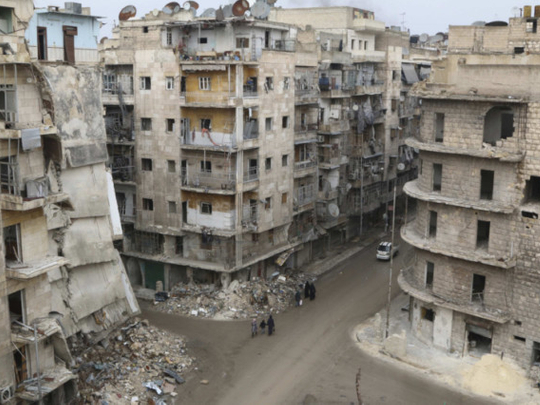
United Nations Special Envoy to Syria, Staffan de Mistura, is trying to win regional and international support for his plan to “freeze” conflict in various parts of Syria, starting with Aleppo. De Mistura hopes that local truces will eventually lead to a nation-wide ceasefire between regime and opposition forces and open the way for comprehensive political settlement.
Se Mistura was appointed UN Special Envoy to Syria in July 2014, when hopes for a political solution to the Syrian crisis had run aground with the failure of the Geneva II conference. The presidential elections that were held unilaterally by the regime of Bashar Al Assad in June 2014 had dashed any lingering hope that former special envoy Lakhdar Brahimi may have had of seeing the Geneva I declaration — which stipulated the establishment of a transitional governing body before a final settlement was reached — come to fruition. De Mistura’s appointment came also after the fall of Mosul on June 10 at the hands of Daesh (Islamic State of Iraq and the Levant) and its subsequent expansion across Syria and Iraq. With the focus on the containment of Daesh and negotiations with Iran over its nuclear programme, interest in finding a solution to the conflict in Syria diminished.
De Mistura’s modest plan for Syria originates from ample experience as former UN Envoy to Afghanistan and as an international mediator in conflict-ridden countries such as Kosovo, Lebanon, Iraq and Sudan among others. De Mistura thus started from the notion that the complexity of the Syrian crisis, with its intricate civil conflict and even more complex international dimensions, makes a solution intractable in the short or medium term. His approach thus differs from that of his predecessors Kofi Annan and Brahimi, placing a premium on partial solutions and modest objectives centred on reducing the level of violence and improving the delivery of humanitarian assistance. In his words: “Sowing the seeds of a comprehensive political process”, rather than the continued expectation of an emerging international and regional consensus that would lead to the Geneva I agreement being implemented. In other words, rather than coming up with a comprehensive vision to solve the Syrian crisis, De Mistura is moving the wheels forward slowly, but steadily towards creating that vision.
To carry out his plan, De Mistura has counted on the Syrian regime and Iran to agree to his plan, which in many ways can be said to correspond to their own. Temporary truces and reconciliation agreements in vital besieged areas of Syria have been well underway since the start of the year. Fighting stopped in several districts south of Damascus and in Homs on the basis of an agreement being reached for the evacuation of rebel fighters from the old city. There are some critical differences, however, between the truce the regime seeks and that of De Mistura’s. While the regime made any distribution of humanitarian aid and the release of detainees contingent upon an area’s decommissioning of its heavy weaponry, De Mistura’s proposed freeze of fighting allows each side to retain its military capability. As a result, Bashar Al Assad has so far declined to taking a clear stand on the proposed initiative, merely saying that it was “worthy of study”. For his part, De Mistura chose not to mention the “Geneva Process”. Syria’s opposition is itself split on De Mistura’s plan, between complete rejection and conditional acceptance.
The split goes beyond the country’s political and military opposition and extends to the wider population. Some believe that the De Mistura’s plan offers a piecemeal solution and is therefore tantamount to a surrender to the regime, with appalling disregard for the sacrifices made by the rebels and opposition forces. Others perceive it as being simply a temporary freeze of the war that could relieve the plight and lessen the sufferings of the people.
The current division can be considered a continuation of an earlier debate around the feasibility of local truces and reconciliation initiatives. With the prolongation of suffering and ever-shifting international priorities, De Mistura has carried on with rounding up support for his proposals. Under the heading ‘Stopping the Advance of Isil [Daesh]”, De Mistura has counted upon western acceptance and the absence of any objection from the regional actors involved in the Syrian crisis. He is also counting on Russia to exert pressure on the regime to accept his proposals along the lines seen during the chemical weapons disarmament. He then hopes that the UN Security Council will approve his initiative as binding for all parties and as a basis for a country-wide ceasefire. De Mistura seems to be having no illusions that this will not be an easy undertaking.
Dr Marwan Al Kabalan is a lecturer in media and international relations, Faculty of Political Science and Media, Damascus University, Syria. He can be contacted at: makabalan@gulfnews.com












